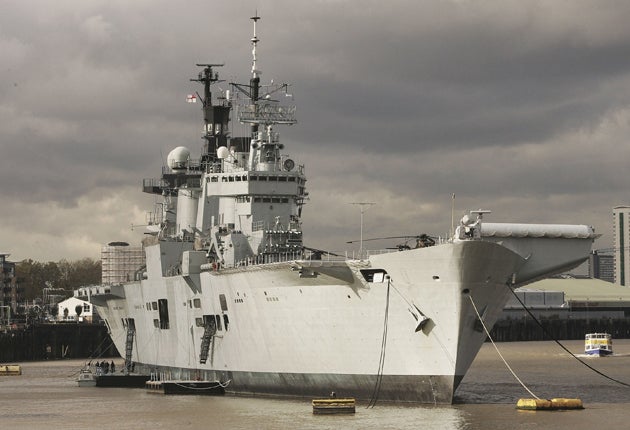Cost of Royal Navy carriers 'may rise to £7bn'

Your support helps us to tell the story
From reproductive rights to climate change to Big Tech, The Independent is on the ground when the story is developing. Whether it's investigating the financials of Elon Musk's pro-Trump PAC or producing our latest documentary, 'The A Word', which shines a light on the American women fighting for reproductive rights, we know how important it is to parse out the facts from the messaging.
At such a critical moment in US history, we need reporters on the ground. Your donation allows us to keep sending journalists to speak to both sides of the story.
The Independent is trusted by Americans across the entire political spectrum. And unlike many other quality news outlets, we choose not to lock Americans out of our reporting and analysis with paywalls. We believe quality journalism should be available to everyone, paid for by those who can afford it.
Your support makes all the difference.The final cost of the Royal Navy's two new aircraft carriers will not be known until the end of next year, official sources confirmed today amid reports that it could rise by up to £2 billion.
Defence Secretary Liam Fox insisted that the Ministry of Defence will take a "fairly stiff view" of any price increases in the massive contracts.
And he made clear that he has no intention of seeking to reopen last autumn's Strategic Defence and Security Review (SDSR), which cut a number of programmes and put back the launch date of the new carriers.
BBC reports suggested that building the HMS Queen Elizabeth and HMS Prince of Wales could end up costing the taxpayer £7 billion, up from the £5.2 billion expected at the time of the SDSR.
The ships, which are to be converted to be compatible with US jets, escaped the axe in the defence review despite massive cuts elsewhere in the Ministry of Defence budget.
They are being built by the Aircraft Carrier Alliance, consisting of BAE Systems, Babcock and Thales. HMS Queen Elizabeth will be the first to enter service, in 2019.
An MoD spokesman said final costs were "yet to be agreed".
"The conversion of the Queen Elizabeth Class, announced in the SDSR, will allow us to operate the carrier variant of the Joint Strike Fighter that carries a greater payload, has a longer range and is cheaper to purchase," he said.
"This will give our new carriers, which will be in service for 50 years, greater capability and inter-operability with our allies. Final costs are yet to be agreed and detailed work is ongoing. We expect to take firm decisions in late 2012."
Speaking at a Westminster lunch, Dr Fox accepted that the Government had increased the budget and time needed for the carrier project by introducing changes to the design to allow interoperability with US and French forces.
But he said: "What we are looking at is a capability that will last us, when we have it, for 50 years. Therefore it is essential to get the decisions right."
He added: "We will look at the contracting as we go through to the end of 2012 with a fairly stiff view."
Under new cost-control systems at the Ministry of Defence, officials must make quarterly reports on the 20 biggest procurement programmes - including the carriers - and those which are not within budget and within time will be summoned before Dr Fox to explain why.
In cases where no adequate explanation is given, the MoD will publish the details in order to allow the stock market to see which contractors' projects are at risk, effectively creating a new mechanism to keep costs down, said the Defence Secretary.
Dr Fox said that the SDSR could not be reopened without rewriting Chancellor George Osborne's Comprehensive Spending Review, which set the parameters for government spending over the coming four years.
"If you believe we should open the CSR, say so, but if you want to reopen the spending round and you want to spend more money, tell us which taxes you want to raise, tell us where you want to cut other budgets or tell us if you want to go back on a borrowing spree," he said.
The UK's massive state deficit was "a national security liability", with interest payments of £46 billion a year outstripping the combined defence, foreign and overseas aid budgets.
"That worries me in terms of the long-term potential effects," said Dr Fox.
"That is why, although I am a self-confessed hawk on the issue of defence, I am at least as hawkish on the issue of the deficit. It is a long-term strategic liability if we don't bring our economy back into balance."
Asked if more money would produce a better armed forces, he replied: "Would the MoD like more money? Of course we would like more money, but not at the expense of the wider economy."
A larger budget would allow the MoD "to buy more capability", he said, but added: "Whether you would get a better military is a very different question."
Labour said the new doubts over the cost of the carriers showed the SDSR was "unravelling".
Shadow defence secretary Jim Murphy said: "This is yet more evidence that the Government's rushed defence review was not thoroughly thought through or costed.
"Ministers must now be clear with the British public about the real costs of their decisions. This could be a £2 billion bungle.
"The Government has totally mishandled the UK's carrier capability and now needs to be totally clear about whether both carriers will be completed and capable of deployment."
Join our commenting forum
Join thought-provoking conversations, follow other Independent readers and see their replies
Comments